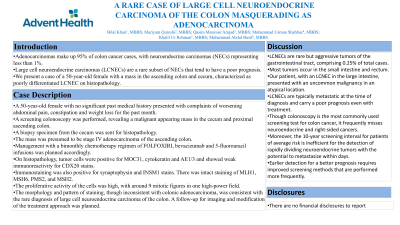Sunday Poster Session
Category: Colon
P0263 - A Rare Case of Large Cell Neuroendocrine Carcinoma of the Colon Masquerading as Adenocarcinoma
Sunday, October 22, 2023
3:30 PM - 7:00 PM PT
Location: Exhibit Hall

Has Audio

Bilal Khan, MBBS
Allama Iqbal Medical College
Orlando, FL
Presenting Author(s)
Bilal Khan, MBBS1, Mariyam Qureshi, MBBS2, Qasim Manzoor Amjad, MBBS1, Muhammad Usman Shahbaz, MBBS1, Khalil Ur Rehman, MBBS2, Muhammad Abdul Basit, MBBS3
1Allama Iqbal Medical College, Orlando, FL; 2King Edward Medical College, Orlando, FL; 3Services Institute of Medical Sciences, Orlando, FL
Introduction: Adenocarcinomas make up 95% of colon cancer cases, with neuroendocrine carcinomas (NECs) representing less than 1%. Large cell neuroendocrine carcinomas (LCNECs) are a rare subset of NECs that tend to have a poor prognosis. We present a case of a 50-year-old female with a mass in the ascending colon and cecum, characterized as poorly differentiated LCNEC on histopathology.
Case Description/Methods: A 50-year-old female with no significant past medical history presented with complaints of worsening abdominal pain, constipation and weight loss for the past month. A screening colonoscopy was performed, revealing a malignant appearing mass in the cecum and proximal ascending colon. A biopsy specimen from the cecum was sent for histopathology. The mass was presumed to be stage IV adenocarcinoma of the ascending colon. Management with a bimonthly chemotherapy regimen of FOLFOXIRI, bevacizumab and 5-fluorouracil infusions was planned accordingly. On histopathology, tumor cells were positive for MOC31, cytokeratin and AE1/3 and showed weak immunoreactivity for CDX20 stains. Immunostaining was also positive for synaptophysin and INSM1 stains. There was intact staining of MLH1, MSH6, PMS2, and MSH2. The proliferative activity of the cells was high, with around 9 mitotic figures in one high-power field. The morphology and pattern of staining, though inconsistent with colonic adenocarcinoma, was consistent with the rare diagnosis of large cell neuroendocrine carcinoma of the colon. A follow-up for imaging and modification of the treatment approach was planned.
Discussion: LCNECs are rare but aggressive tumors of the gastrointestinal tract, comprising 0.25% of total cases. Most tumors occur in the small intestine and rectum. Our patient, with an LCNEC in the large intestine, presented with an uncommon malignancy in an atypical location. LCNECs are typically metastatic at the time of diagnosis and carry a poor prognosis even with treatment. Though colonoscopy is the most commonly used screening test for colon cancer, it frequently misses neuroendocrine and right-sided cancers. Moreover, the 10-year screening interval for patients of average risk is inefficient for the detection of rapidly dividing neuroendocrine tumors with the potential to metastasize within days. Earlier detection for a better prognosis requires improved screening methods that are performed more frequently.
Disclosures:
Bilal Khan, MBBS1, Mariyam Qureshi, MBBS2, Qasim Manzoor Amjad, MBBS1, Muhammad Usman Shahbaz, MBBS1, Khalil Ur Rehman, MBBS2, Muhammad Abdul Basit, MBBS3. P0263 - A Rare Case of Large Cell Neuroendocrine Carcinoma of the Colon Masquerading as Adenocarcinoma, ACG 2023 Annual Scientific Meeting Abstracts. Vancouver, BC, Canada: American College of Gastroenterology.
1Allama Iqbal Medical College, Orlando, FL; 2King Edward Medical College, Orlando, FL; 3Services Institute of Medical Sciences, Orlando, FL
Introduction: Adenocarcinomas make up 95% of colon cancer cases, with neuroendocrine carcinomas (NECs) representing less than 1%. Large cell neuroendocrine carcinomas (LCNECs) are a rare subset of NECs that tend to have a poor prognosis. We present a case of a 50-year-old female with a mass in the ascending colon and cecum, characterized as poorly differentiated LCNEC on histopathology.
Case Description/Methods: A 50-year-old female with no significant past medical history presented with complaints of worsening abdominal pain, constipation and weight loss for the past month. A screening colonoscopy was performed, revealing a malignant appearing mass in the cecum and proximal ascending colon. A biopsy specimen from the cecum was sent for histopathology. The mass was presumed to be stage IV adenocarcinoma of the ascending colon. Management with a bimonthly chemotherapy regimen of FOLFOXIRI, bevacizumab and 5-fluorouracil infusions was planned accordingly. On histopathology, tumor cells were positive for MOC31, cytokeratin and AE1/3 and showed weak immunoreactivity for CDX20 stains. Immunostaining was also positive for synaptophysin and INSM1 stains. There was intact staining of MLH1, MSH6, PMS2, and MSH2. The proliferative activity of the cells was high, with around 9 mitotic figures in one high-power field. The morphology and pattern of staining, though inconsistent with colonic adenocarcinoma, was consistent with the rare diagnosis of large cell neuroendocrine carcinoma of the colon. A follow-up for imaging and modification of the treatment approach was planned.
Discussion: LCNECs are rare but aggressive tumors of the gastrointestinal tract, comprising 0.25% of total cases. Most tumors occur in the small intestine and rectum. Our patient, with an LCNEC in the large intestine, presented with an uncommon malignancy in an atypical location. LCNECs are typically metastatic at the time of diagnosis and carry a poor prognosis even with treatment. Though colonoscopy is the most commonly used screening test for colon cancer, it frequently misses neuroendocrine and right-sided cancers. Moreover, the 10-year screening interval for patients of average risk is inefficient for the detection of rapidly dividing neuroendocrine tumors with the potential to metastasize within days. Earlier detection for a better prognosis requires improved screening methods that are performed more frequently.
Disclosures:
Bilal Khan indicated no relevant financial relationships.
Mariyam Qureshi indicated no relevant financial relationships.
Qasim Manzoor Amjad indicated no relevant financial relationships.
Muhammad Usman Shahbaz indicated no relevant financial relationships.
Khalil Ur Rehman indicated no relevant financial relationships.
Muhammad Abdul Basit indicated no relevant financial relationships.
Bilal Khan, MBBS1, Mariyam Qureshi, MBBS2, Qasim Manzoor Amjad, MBBS1, Muhammad Usman Shahbaz, MBBS1, Khalil Ur Rehman, MBBS2, Muhammad Abdul Basit, MBBS3. P0263 - A Rare Case of Large Cell Neuroendocrine Carcinoma of the Colon Masquerading as Adenocarcinoma, ACG 2023 Annual Scientific Meeting Abstracts. Vancouver, BC, Canada: American College of Gastroenterology.
